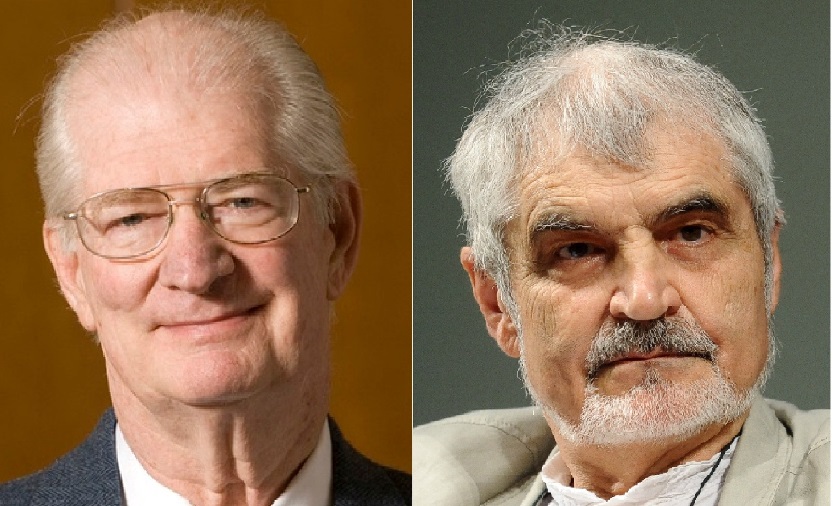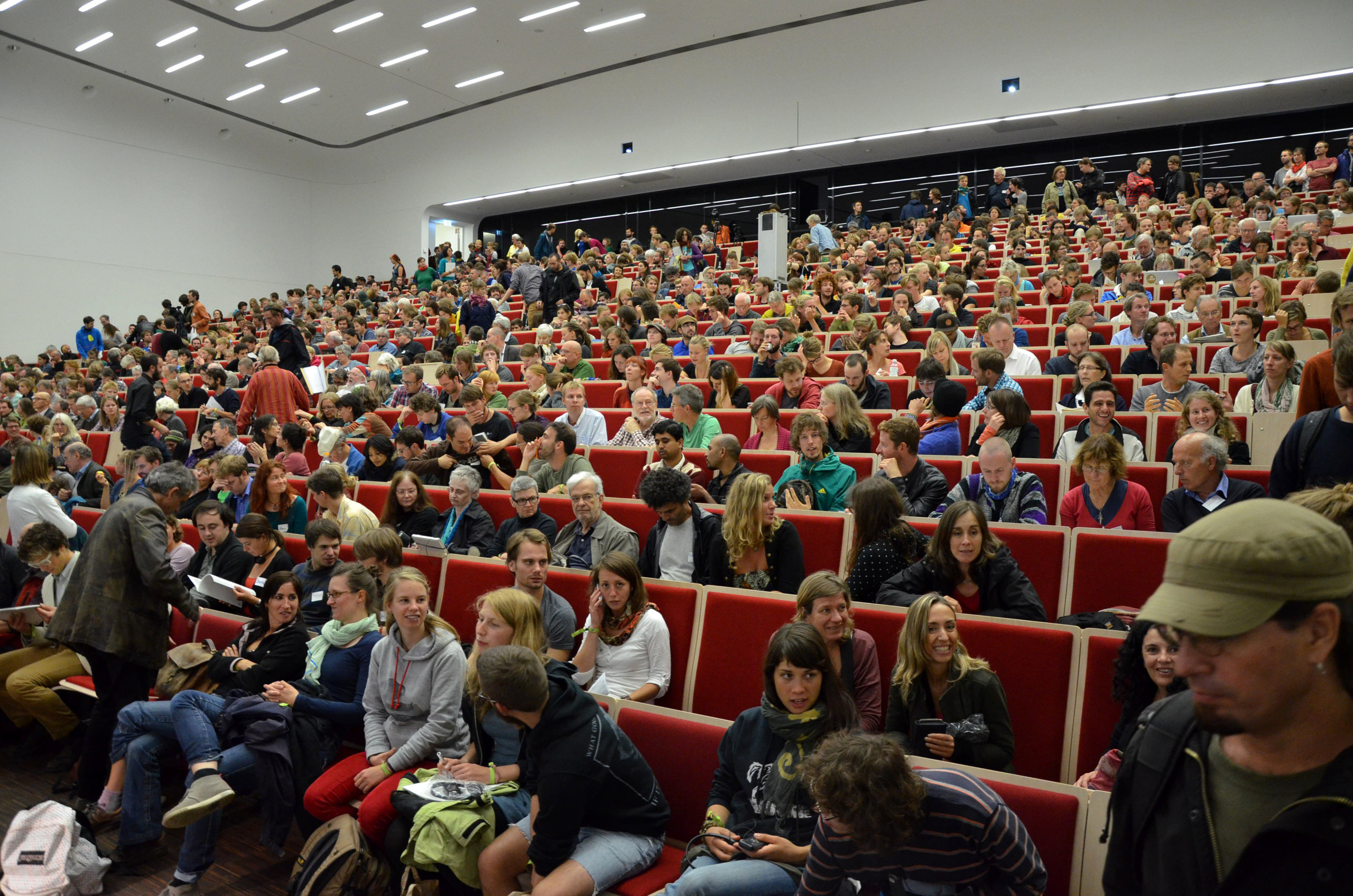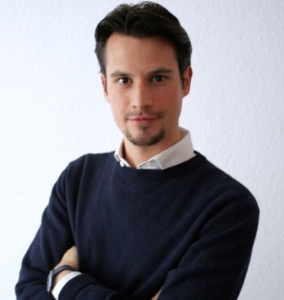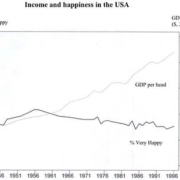Degrowth Toward a Steady State Economy: Unifying Non-Growth Movements for Political Impact
by Brian Czech and Riccardo Mastini
No later than the 1960s, scholars wrote in rigorous terms of the limits to economic growth. Europeans such as E.F. Schumacher, Americans including Herman Daly, and European-born Americans (most notably Nicholas Georgescu-Roegen and Kenneth Boulding) set the stage for later studies in ecological economics and sustainability science. Their scholarship, supplemented by the population focus of Paul Ehrlich and the modeling approach of Donella Meadows and coauthors (for the Club of Rome), resonated with ecologists and opened the eyes of millions of concerned citizens worldwide.
The “limits to growth movement” was allied in effect with the environmental movement of the 1960s and early 1970s. As indicated by the events of the first Earth Day in 1970, the environmental movement had a global aspect and was a major political phenomenon in many countries. It too had its progenitors. In the USA Rachel Carson, Barry Commoner, and David Brower were in the vanguard, and limits to growth were in their academic DNA. They were essentially “economists of nature” who were steeped in the concept of carrying capacity.
The cumulative movement—limits to growth and environmental protection—was characterized by a rapidly mounting concern over destructive economic activity. The critique of growth was therefore accompanied by skepticism about the behavior of corporations. In Europe, especially, the sustainability of capitalism itself was called into question, with or without Marxist leanings.

The Cold War score was kept in GDP and was, therefore, highly unsustainable. (Image CC BY-SA 4.0, Credit: Carlos3653)
Although the critique of growth was focused on and in capitalist countries, astute observers noted an obsession with economic growth in socialist and communist countries as well. At the time, the most profound example was the Soviet Union. The Cold War, after all, was waged in terms of GDP, as described in meticulous detail by Robert Collins in More: The Politics of Economic Growth in Postwar America.
While the cumulative movement had some tangible successes, these were primarily of a regulatory nature for specific environmental protections, including clean air policies and the establishment of national parks in the UK and France. Meanwhile in the USA, the Clean Air Act and the Clean Water Act were passed, and the Environmental Protection Agency was established to give the legislation teeth. The National Environmental Policy Act also helped to prevent the “sneaking” of environmentally devastating projects into the federal budget without copious public review and discussion.
Little, on the other hand, was done to actually check the rates of economic growth in Europe or the USA. In fact, virtually nothing was done explicitly to that effect, and hardly anyone aside from Herman Daly even called for it in policy terms.
Perhaps the closest thing to macroeconomic reform was the Endangered Species Act of 1973. In the preamble, the 93rd American Congress found and declared that “species have been rendered extinct as a consequence of economic growth and development…” and went on to provide strict protections for threatened and endangered species. In essence, the Endangered Species Act was an implicit (and unintended, for most legislators) prescription for a steady state economy, albeit a steady state with a long list of species dangling from one last twig on the tree of life (see Czech and Krausman 2001).
The alternatives to growth were always obvious, starting with the opposite of growth; that is, recession, shrinkage, or “degrowth.” In between the two opposites was stability, equilibrium, or what Daly called the “steady state economy.”
Daly vs. Georgescu-Roegen: Less a Debate than a Different Frame of Time
When Daly started advancing the steady state economy as the sustainable alternative to growth, Georgescu-Roegen protested, as he had described in magnificent detail the unrelenting forces of entropy, which eventually brings down any economy on Earth as the sun runs out of hydrogen. But Daly acknowledged as much. Indeed Daly’s steady-state economics was born out of insights derived largely from Georgescu-Roegen, who was Daly’s Ph.D. advisor at Vanderbilt.
The contrast between Daly’s steady-state emphasis and Georgescu-Roegen’s entropy focus was hardly a political debate with policy implications. Instead it was theoretical and philosophical, applying primarily to the longest of long terms, not policy-relevant planning terms. Daly’s favorite metaphor of a long-term economy was a candle. The candle must first be lit, then will burn, and eventually must die out. The candle’s “production” can approximate a steady state for all but the lighting and the dying.
Unfortunately, however, the global economy was starting to look like a Roman candle with a suddenly vulnerable wick. Non-renewable resources—or “natural capital” stocks—were being liquidated, and the economy would have to recede to a level sustainable with renewable resources. This was a matter of common sense, yet the laws of thermodynamics were required to refute the notions of neoclassical economists who believed in perpetual substitutability of resources in an ever-growing economy.
There was a sort of middle ground: Within limits, additional mastery over the use of renewables could take up some of the slack as non-renewables were liquidated. Also during this adjustment phase, recycling of non-renewables would still be economic. An emphasis on efficiency has found renewed vigor with visions of a “circular economy.”
A Sustainability Slogan for the 21st Century: Clear, Accurate, and Policy-Relevant
Our focus for the current purposes, however, should be less on the technics of growth, degrowth, or the steady state economy, and more on the political common ground of degrowth and steady-state movements. The predominantly European “degrowthers” and the predominantly American (and Australian) “steady staters” would all have more cachet, influence, and success if they were united in their efforts to topple economic growth from the pedestal of politics and policy.
Our unified slogan ought not be simply “steady state economy” or “degrowth,” but rather “Degrowth Toward a Steady State Economy.” The slogan is perfectly clear, charts a path, and readily rolls off the tongue. It passes the test for effective slogans.
The vast majority of tips on communications, rhetoric, and marketing come from the context of business. While we can’t reduce social movements and statesmanship to salesmanship, the basics of effective slogans would seem to apply in all scenarios. Consider for example the “5 Tips for Writing an Effective Slogan” described by Dan Smith of Business Insider.
Smith’s tips 1 and 2 overlap substantially. Tip 1 is, “Highlight a key benefit. The point of a slogan is to differentiate your product or brand from that of your competitors, while also underscoring the company’s general mission.” Tip 2 is, “Explain the company’s commitment… differentiate the company from other competitors.”
How could we possibly explain our commitment more clearly with a handful of words? “Degrowth Toward a Steady State Economy.” This is our vision of sustainability, including environmental protection, economic sustainability, and peace among nations. As for differentiation, in calling for a clear alternative to growth, how could we be more differentiated from Wall Street, the World Bank, and most governments of the world, each of whom are competitors for the macroeconomic vision of the 21st century?

Herman Daly (left) and Serge Latouche (right), champions of the steady-state and degrowth movements, respectively. (Left Image: credit by Herman Daly; Right image: Image CC BY-SA 3.0, Credit: Niccolò Caranti)
Tip 3. “Keep it short. Slogans should never be longer than a sentence and ideally should hit the sweet spot between six to eight words.”
“Degrowth Toward a Steady State Economy” weighs in at precisely six words comprising eleven syllables.
Tip 4. “Give them a rhythm, rhyme, and ring. A slogan longer than a single word should fulfill at least two of these three criteria.”
Well, there’s only so much you can do with a topic as heavy and demanding as limits to growth. We’re not selling paper towels here (the example provided at Smith’s article). Given the scope of the topic, it’s a relief that “Degrowth Toward a Steady State Economy” contains no problematic phonetics and causes no tongue-twisting. Also, in the context of discussions, articles, or media coverage, after the slogan has been introduced it can be referred to with the shorthand, “degrowth toward a steady state,” which rolls off the tongue more readily yet. For those so inclined, even rhyming is not out of the question. It isn’t difficult to imagine the late Kenneth Boulding quipping, “Degrowth toward a steady state—do it ‘fore it’s way too late.”
Tip 5. “Stay honest. When writing a slogan, it’s extremely easy to get carried away; however, it’s imperative that the slogan accurately reflects the business. In other words, hyperbole is extremely discouraged.”
How could we be more honest about what “business” we’re in? We’re offering the sustainable alternative to growth, not some dishonest oxymoron such as “green growth” or “sustainable growth.” Nor are we exaggerating with, for example, “degrowth toward Heaven on Earth,” or “degrowth for infinite ecstasy.” We are advocating, quite clearly, for degrowth toward a steady state economy. Why not call it precisely that?
Disharmony Between North American and European Sustainability Advocates?
One wonders why “Degrowth Toward a Steady State Economy” hasn’t proliferated already among degrowthers and steady staters. Certainly the connection got off to a promising start in 2002. That’s when Herman Daly and Serge Latouche were honored side by side in Rimini, Italy, each with a Medal of the Italian Government for their groundbreaking work in steady-state and degrowth economics, respectively.
At CASSE, we use “degrowth toward a steady state economy” a lot, especially in speeches and social media, helping to empower the degrowth movement along with steady-state economics. The slogan works perfectly fine in academic articles as well (see for example O’Neill 2012, Sapinski 2015). In 2018 the nascent DegrowUS adopted the mission statement, “Our mission is a democratic and just transition to a smaller, steady state economy in harmony with nature, family, and community.” Yet the phrase “steady state economy” seems glaring in its absence from the European scene today, even in English-speaking venues. We can think of several potential reasons, and heretofore we hypothesize briefly about two.
Might it be, ironically, that Americans from broader sustainability circles are largely responsible? Many elder Americans, especially, still have Cold War sensitivities, whereby the phrase “steady state economy” evokes thoughts of the Soviet Gosplan, the central economic planning apparatus of the Soviet era. Such sensitivities may be largely subconscious, as several generations of Americans were essentially “programmed” into fear or loathing of the Soviet Union and, by association, central planning of economic activity. Self-aware scholars and sustainability leaders, while themselves long past the Cold War, may strongly suspect—perhaps correctly—that much of the American philanthropy community (which tends to be elderly by its nature) would not cotton the phrase.
Avoidance of the phrase “steady state economy” for fear of being politically marginalized (and losing out on grant money in academia and the non-profit sector) is understandable, but it hasn’t been helpful for advancing the steady state economy, much less degrowth, in politics and policy. If only American leaders in environmental protection, economic sustainability, and international diplomacy had spent some time sharpening their steady-state rhetoric over the past five decades, “steady state economy” would be far closer to vernacular. Only when explicit discussion of the steady state economy is in the vernacular can we expect American policy reforms conducive to degrowth toward a steady state economy.

2014 Degrowth Conference, Leipzig University. Hundreds of degrowthers have signed the CASSE position on economic growth at degrowth conferences since the beginning of the movement. (Image CC BY-SA 3.0 DE, Credit: Eva Mahnke)
The second hypothesis pertains to a small but vocal group of Marxists from several continents who have stubbed a collective toe on the work of Herman Daly. Daly has acknowledged the relative efficiency of markets for allocating a very specific and limited set of goods; namely “rival and excludable goods” (basically the small stuff such as boots and tin cans), and definitely not public goods and services (the big stuff such as environmental protection and national defense). Daly has also proposed solutions that entail tightly regulated market mechanisms, such as cap-and-trade systems conducive to sustainable scale, just distribution, and efficient allocation. Furthermore, Daly and generations of students, including textbook co-author Josh Farley, have recognized in detail the types and sources of market failure, even among the widget sectors (see for example Daly and Farley 2010).
Despite Daly’s careful, nuanced, and discerning assessment of markets and market-like mechanisms, the handful of vocal reactionaries seem to view him as an apologist for laissez-faire capitalism! This incredibly ironic misinterpretation of Daly’s life and work has furthermore led additional folks to overlook, ignore, or even object to steady-state economics itself, the highlight of which is, of course, the steady state economy as macroeconomic goal. Steady-state economics might be the biggest baby to ever be tossed with any bathwaters.
To the extent that sustainability advocates are misled into thinking of Daly—and even all of steady-state economics—as a capitalist enemy instead of a perfectly natural ally, it cripples the collective non-growth movement.
Coming Full Circle
Whenever a question arises about the macroeconomics of sustainability, it behooves us to consider the three basic alternatives: growth, degrowth, and the steady state economy. Neither growth nor degrowth are sustainable in the long run. This is most obvious in the case of degrowth. Meanwhile, the full body of work by Herman Daly, CASSE, and our many friends and colleagues in ecological economics (not always well-represented in Ecological Economics) makes it obvious enough regarding growth as well. This leaves the steady state economy as the sustainable alternative.
But what if—as indeed is clearly the case—the present economy has already grown too large for sustainability, much less optimality? (Think especially of American, European, and global economies.) Well, that brings us full circle:
No later than the 1960s, scholars wrote in rigorous terms of the limits to economic growth. Europeans such as E.F. Schumacher, Americans including Herman Daly, and European-born Americans (most notably Nicholas Georgescu-Roegen and Kenneth Boulding) set the stage…
Literature Cited
Collins, R.M. 2000. More: The politics of economic growth in postwar America. Oxford University Press, Oxford, U.K. 299pp.
Czech, B., and P.R. Krausman. 2001. The Endangered Species Act: History, conservation biology, and public policy. Johns Hopkins University Press. 212pp.
Daly, H.E., and J. Farley. 2010. Ecological economics: principles and applications. Second edition. Island Press, Washington, DC. 544pp.
O’Neill, D.W. 2012. Measuring progress in the degrowth transition to a steady state economy. Ecological Economics 84:221-231.
Sapinski, J.P. 2015. Climate capitalism and the global corporate elite network. Environmental Sociology 1(4):268-279. (http://dx.doi.org/10.1080/23251042.2015.1111490)

Brian Czech is the founder and executive director of CASSE. He has authored three books and has published over 50 academic journal articles. He served as conservation biologist for the U.S. Fish and Wildlife Service from 1999-2017 and as a visiting professor of natural resource economics in Virginia Tech’s National Capitol Region.
 Riccardo Mastini is a PhD candidate at the Autonomous University of Barcelona, where he specializes in ecological economics and political ecology. He is a member of the academic collective Research & Degrowth and one of the editors of Degrowth.info,. He is also CASSE’s Barcelona Chapter Director.
Riccardo Mastini is a PhD candidate at the Autonomous University of Barcelona, where he specializes in ecological economics and political ecology. He is a member of the academic collective Research & Degrowth and one of the editors of Degrowth.info,. He is also CASSE’s Barcelona Chapter Director.







perhaps a little 2 late. i have sort of alienated the degrowth, steady state and ecological economics communities as well as mainstream environmentlaists.
there’s still hope. all these groups have to stop killing their young and learn to have both a sense of humor and sense of rigor.
Thanks for the impetus to think about all this!
Where I stand, outside academia and living among by a community of activists and change-makers, I don’t think the phrase “Degrowth towards a steady-state economy” will work. But my response has 734 too many words in it, so I posted it here:
https://thepracticalutopian.ca/2020/02/05/degrowth-a-response-to-brian-czech-and-riccardo-mastini/
Best wishes to all,
Guy Dauncey
http://www.thepracticalutopian.ca
I have to disagree with the premise of the argument you posted at your website. Neither “degrowth” nor “steady state economy” are “boring” when growing masses of people are getting desperate for a real, meaningful, policy-relevant alternative to unsustainable, reckless, environmentally devastating economic growth.
I’ll never forget encountering the phrase “steady state economy” during my Ph.D. research some 20+ years ago. I was absolutely thrilled at finding what instantly struck me as THE most powerful concept for conservation I had ever seen. I’ve encountered plenty of people who’ve had similar reactions. They’ve become motivated and activated by the phrases “steady state economy” and “degrowth.”
Frankly, and I’m just being as honest as you were, the phrase “New Ecological Civilization” sounds somewhat boring to me—and I’m originally an ecologist. It’s just too squishy, too non-specific, too policy-irrelevant, and too readily framed as sort of pie-in-the-skyish.
That said, I heartily applaud you for thinking way outside the box of neoclassical economics and proposing a concept and slogan that is certainly better than the oxymoronic “green growth” or “sustainable growth.”
Thanks for the response, Brian. It’s good to hearthat some people get very motivated by those phrases. Not me, that’s all.
I absolutely agree that we need a “a real, meaningful, policy-relevant alternative” to the current mess. As to a name – I collect them! Her’s my current list of 81 proposed names:
https://thepracticalutopian.ca/2017/06/03/what-shall-we-call-the-new-economy-we-need-so-much/
The term “socialism” is also “squishy, too non-specific, too policy-irrelevant, and too readily framed as sort of pie-in-the-skyish”; the term “social democracy”, too, but that didn’t prevent the terms from taking hold in people’s hearts. The same applies to “communism” and “capitalism” and “free market”. They all say nothing, but are code for everything. The same can be true for “A New Ecological Civilization”.
The branding is not about the details – it’s about capturing people’s imaginations, and their hearts. My regular work is packed full of specific policy details, as my website shows, especially on climate and economy.
And thanks for all the great work, regardless of our naming disagreements!
Amazing! It’s slowly becoming mainstream… Just came out on The New Yorker..
https://www.newyorker.com/magazine/2020/02/10/can-we-have-prosperity-without-growth?utm_source=twitter&utm_medium=social&utm_campaign=onsite-share&utm_brand=the-new-yorker&utm_social-type=earned&fbclid=IwAR1r5Lx9jA0IW3U5RGfVd6D4VX5QdOyK52QdwBGVTCFrzBDbAS7Dk0fbsz8
I’m not at all sure about your hypothesis about the “small but vocal group of Marxists” who you later rather puzzlingly refer to as “reactionaries”. Who are you talking about? You neither identify them nor cite their work. I agree with you about Daly and Farley’s nuanced approach to markets. Most serious Marxist commentators would have a similar position since the essence of capitalism isn’t the market but the expropriation of surplus value in the service of profit and thereby endless capital accumulation. Where leftists do tend to disagree with Daly is on population and migration. This is well explored in work by Kallis (not a Marxist so far as I can tell), for example. I would actually see Daly’s position as mainstream social democratic, closer to the Scandinavian tradition.
For the forthcoming (Sept 2020. Manchester) International Joint Conference on Degrowth and Ecological Economics we’ve adopted the strapline “Degrowth for an ecological economy”. It’s OK, though it does have the disadvantage of suggesting an economic reductionism. I think we’d all share the post-Marxist Andre Gorz’s emphasis on combating the narrowness of economic reason and thinking of a society that operates within planetary limits, delivering social justice.
One of the key points of our article is about throwing the baby out with the (real or perceived) bathwaters. Not saying you have done that, Mark, but certainly some have, and it is worth taking the opportunity here to emphasize that steady-state economics is not defined as every word ever written by a single individual, even Herman Daly. The fact that Daly has wrestled with issues of population and proposed an ethical framework for immigration—imperfect as any such framework must be—shouldn’t result in a rejection of steady-state economics or the goal of a sustainable, steady state economy.
So basically I think there have been two problems—errors even—occurring side by side (and certainly not by everyone):
1) Misinterpretation of and hyper-criticality toward the work of Herman Daly.
2) Equating Herman Daly’s every word as steady-state economics.
Regarding your point about Marxists…we’ll have more to say about the many shades of Marxists in coming articles, including their propensity (or lack thereof) toward steady statesmanship. Thanks for bringing it up here as food for thought.
Looking forward to the Degrowth/ISEE conference!
Dear Sirs! As an old friend of Dr. Daly, your publia¡cations and effort, are simply
a big mass of fresh air at this time of delusions and tenebrae for World hopes of
appropriate global measures in view of our ecologicl¡al challenges1
Jonathan,
I reject calling people one disagrees with stupid, in general, and, in particular, in a forum like this one, where we all try to find the best and most immediate solutions to the existential threats humanity has created for itself and for millions of other species on Earth. I also reject his critique of the people who are fighting against all odds to change things, including the economy. The last thing the youngsters of FFF and all the other movements is to be put down by Saral or any other adult. I support them fully and protest/take action with them. Please ask Saral to retract or rephrase the last comment. First, because it is offensive. Second, because he is wrong. Gender equality, economic and environmental justice, pursued by the activists he calls “stupid” are the best solutions for bringing human population to a sustainable level.
The main point of the article or manifesto, thank you for writing it, and of our work towards a sustainable planet for all is to find fast a substitute to the current economic model and make it work for all countries, for the young generation and all future generations. The discussion cannot be academic anymore, as we have run of of time for theories and it cannot be adversarial, but collaborative, emphatic, respectful.
There might be several substitutes adopted, tested, adjusted, besides the steady-state economy. We must bring this substitutes in the mainstream of economic thought, in politics, in education, in civic action. Nobody in his or her right mind will ever run on a platform of economic degrowth, not matter how rational it is, because people are constantly scared into the pursuit of GDP growth to which, they are told, there is no good alternative.
)pease read my weblog
I can only summarize certain points here. I responded to Daly and the 1972 MIT study ‘Limits to Growth’ Jackson (Prosperity without Growth, 2009) and Dietz and O’Neill (Enough is Enough. 2013 make a coherent case, but neither addressed the pragmatic obstacles. I saw the need for a catalyst to enable all the obvious proposals which have still not even been started in 2020.
In particular, please look at my blog ‘Page’ on ‘The Tragedy of the Commons’. I hazard an insight that he cause is the persistence of growth strategies beyond the point when the exponential principle suddenly transforms what were always advantageous strategies into dangerous ones.
I am told that Wiikipedia is not the place for ‘original insights’ (their description, thank you). They must be referred by others, and possibly they need to be eminent. Either I suffer from a delusion, or I have a crucial insight. But that we have an eco-emergency is not a delusion.
Hello Brian (et al),
My name is Jim and I live in the Blue Mountains, outside of Sydney, Australia.
I would like to suggest a slogan.
My thoughts were not so much as to explain everything in a few words, but to make people pause and think about the phrase.
“DE-grow to a Steady State”.
People who had never heard of such a concept would surely scratch their heads at the word De-grow and perhaps even Google the whole slogan.
I Googled my suggested phrase, and was taken to many relavent sites, but I couldn’t find “CASSE” mentioned in the time my attention span allowed. But I guess that’s to be expected as that exact phrase would not be on your website.
I think “DE-grow to a Steady State” is worthy of consideration, mainly because it is a short, simple, easy to remember phrase which is also, more importantly, a call to arms.
Regards,
Jim Grant
Thank you very much for the great content